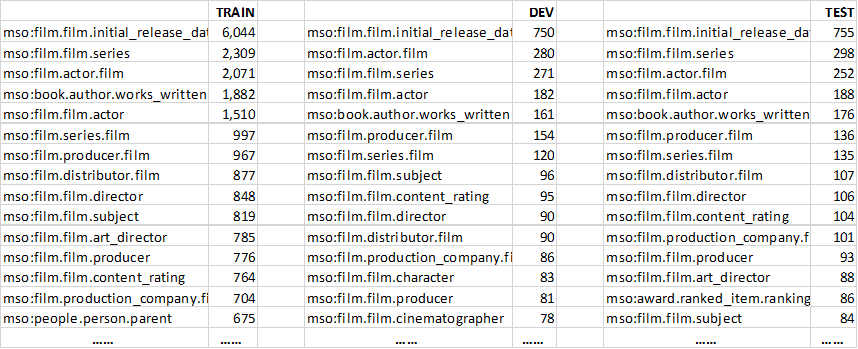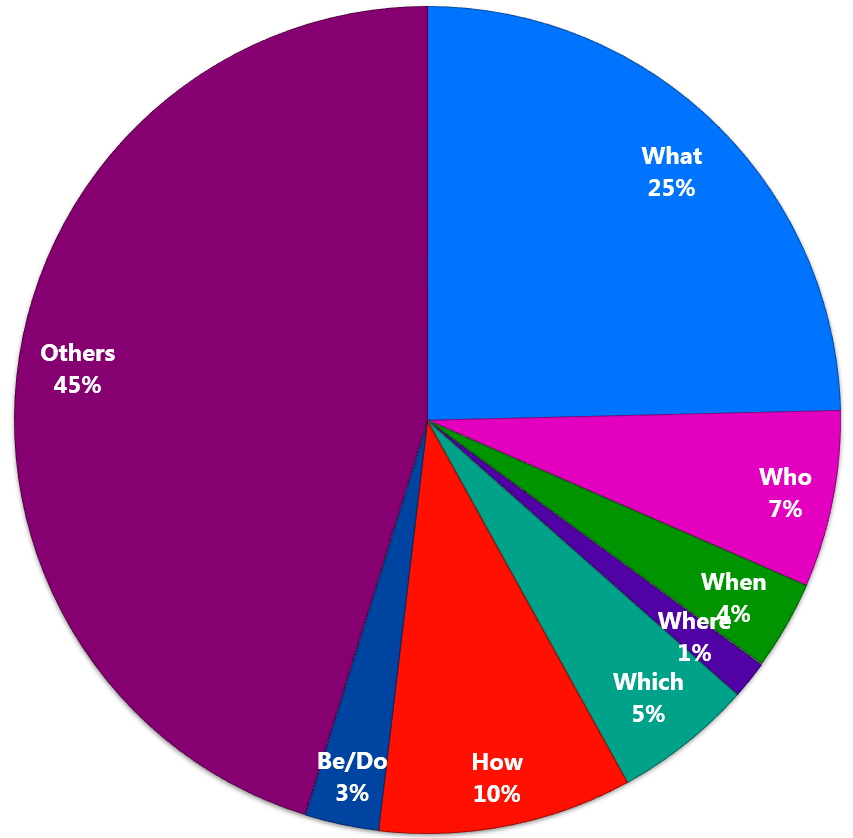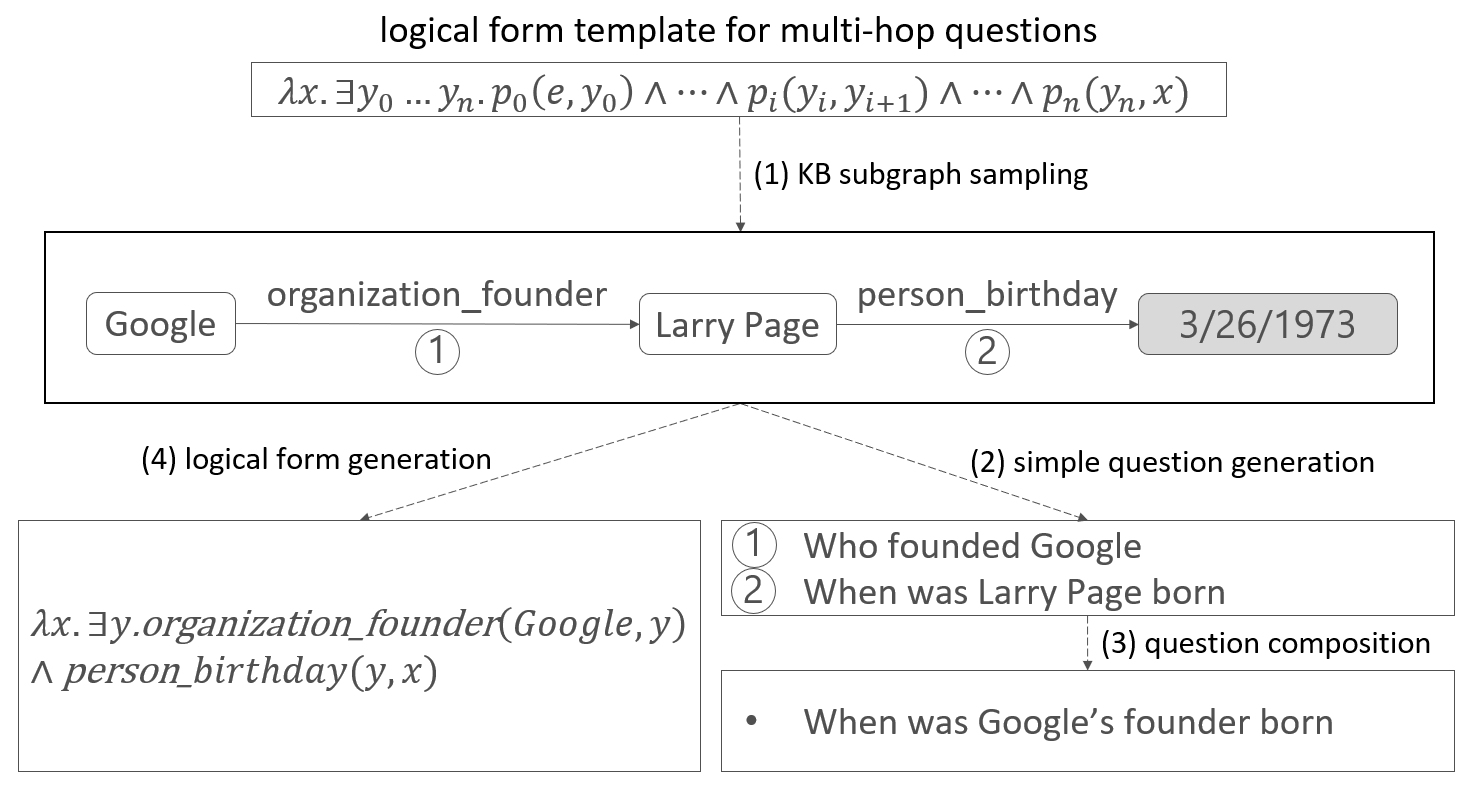msra-nlc / Mspars
Projects that are alternatives of or similar to Mspars
MSParS (V1.0): a Multi-perspective Semantic ParSing Dataset for Knowledge-based Question Answering
Introduction
MSParS is a large-scale dataset for the open domain semantic parsing task. The whole dataset consists of 81,826 samples annotated by native English speakers. We randomly shuffle these samples and use 80% of them (63,826) as training set, 10% as validation set (9,000), and the remaining 10% as test set (9,000). Note that for test set we only publish the questions without annotations, as this dataset is supporting an open evaluation now.
Each sample is a quadruple consists of:
- a question (or multiple questions for the multi-turn QA scenario)
- the logical form(s) representing the semantic meaning(s) of the question(s)
- the parameters (entity/type/value) extracted from the question(s)
- the question type(s)
Different from most exisiting semantic parsing datasets, which are either limited by size or biased on single-relation questions, MSParS covers 9 types of single-turn questions (single-relation, multi-hop, multi-constraint, superlative, aggregation, comparative, yesno, cvt and multi-choice) and 3 types of multi-turn questions (multi-turn-entity, multi-turn-predicate and multi-turn-answer). The total number of the question types is 12.
MSParS is annotated based on Microsoft's open domain knowledge graph, Satori. The entities, predicates and types in MSParS are following the standard forms in Satori. The corresponding Satori snippet will be released later.
In the future, we will expand this dataset to V2.0, by including more types of questions such as clarification questions, adding adversarial samples, annotating non-English questions for the cross-lingual semantic parsing task, etc.
Format and example
<question id=409> computer videogame with the latest release date
<logical form id=409> ( argmax ( lambda ?x ( isa ?x mso:cvg.computer_videogame ) ) ( lambda ?x lambda ?y ( mso:cvg.computer_videogame.release_date ?x ?y ) ) 1 )
<parameters id=409> mso:cvg.computer_videogame (type) [0,1] ||| 1 (value) [-1,-1]
<question type id=409> superlative
==================================================
<question id=8995> name the creative work which was about project mercury ? ||| when did this spaceflight first start ?
<logical form id=8995> ( lambda ?x ( mso:media_common.subject.creative_work project_mercury ?x ) ) ||| ( lambda ?x ( mso:spaceflight.space_program.started project_mercury ?x ) )
<parameters id=8995> project_mercury (entity) [7,8] @Q1 ||| project_mercury (entity) [7,8] @Q1
<question type id=8995> multi-turn-entity
==================================================
Consider the first example, (isa ?x mso:cvg.computer_videogame) declares the variable ?x is a computer videogame, where 'mso:cvg.computer_videogame' is a standard type in the knowledge base. ( mso:cvg.computer_videogame.release_date ?x ?y ) declares that ?y is the release date of the computer video game ?x. Finally (argmax ... 1) rank all computer video game ?x with their release date ?y in descending order and pick the first one, that is the "computer videogame with the latest release date".
The second example is a multi-turn conversation which answering the second question relying on the entity in the first question. Specifically, "this spaceflight" in Q2 denotes the entity project_mercury in Q1.
The logical form we used is a simplified lambda calculus, which is similar with Lambda Dependency-Based Compositional Semantics.
Distribution
The data distribution in the train set, dev set and test set is unbiased. Here is a table shows the nubmers and ratios of different question types in the three datasets.
The dataset contains 2071 different relations and 121 different types. The top 15 frequent relations of the train/dev/test set are shows as follows.
All questions in MSParS are written by human annotaters. These quesitons are highly diverse. The counting of the first word of each question is as follows.
Data Collection
We collected the 12 types of questions in MSParS separately. Given a specific question type such as mutli-hop, we first select some multi-hop subgraphs from KB. Each subgraph consists of two KB triples, where the object entity of the first triple is the subject entity of the second triple. Then, a template-based question generation component is used to generate two natural language questions for these two triples in the subgraph, where the answer of each generated question is the corresponding object entity. In some ceases, an expert will write the seed questions instead of the QG component. Last, through crowd sourcing annotators compose these two questions to form a multi-hop question. The annotators are encouraged to phrase the question differently as much as possible. We used Satori as background Knowledge Base.
Citation
If you use the MSParS dataset in your research, please cite (===== paper will be updated later =====):
@inproceedings{
title={Overview of the NLPCC 2019 Shared Task: Open Domain Semantic Parsing},
author={Nan Duan},
booktitle={NLPCC},
year={2019}
}
NLPCC 2019
MSParS dataset is supporting the shared task 2 (Open Domain Semantic Parsing) in NLPCC 2019.
The CCF International Conference on Natural Language Processing and Chinese Computing (NLPCC) is the annual conference of CCF TCCI (Technical Committee of Chinese Information, China Computer Federation). The NLPCC conferences have been successfully held in Beijing (2012),Chongqing (2013), Shenzhen (2014), Nanchang (2015), Kunming (2016), Dalian (2017) and Hohhot (2018). This year's NLPCC conference will be held in Dunhuang on October 9–14.
Important dates:
- 2019/03/15:announcement of shared tasks and call for participation;
- 2019/04/01:release of detailed task guidelines & training data release;
- 2019/05/15:test data release;
- 2019/05/20:participants’ results submission deadline;
- 2019/05/30:evaluation results release and call for system reports and conference papers;
- 2019/06/30:conference paper submission deadline (only for shared tasks);
- 2019/07/30:conference paper accept/reject notification;
- 2019/08/10:camera-ready paper submission deadline;
- 2019/10/12~14:NLPCC 2019 main conference;




